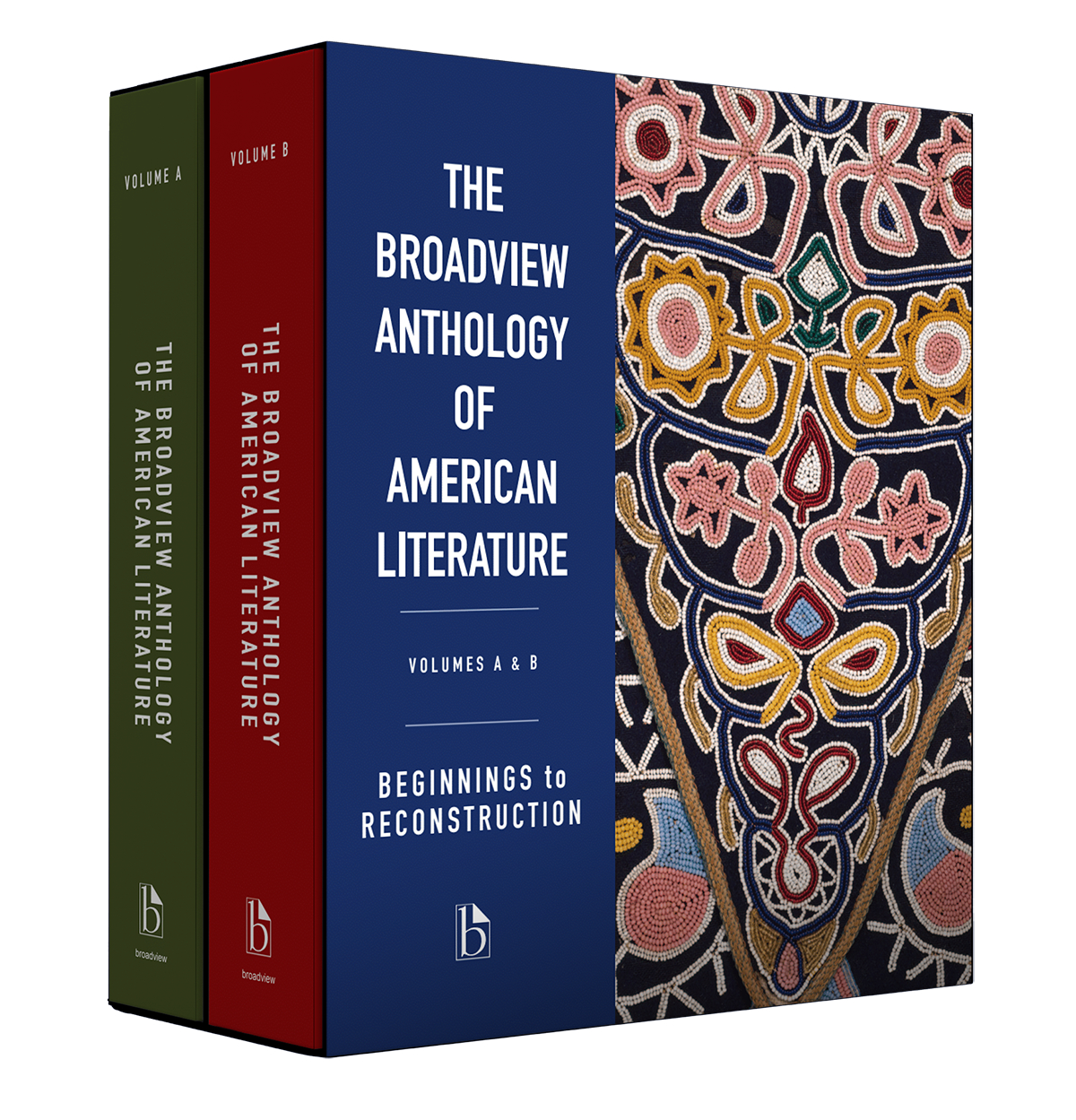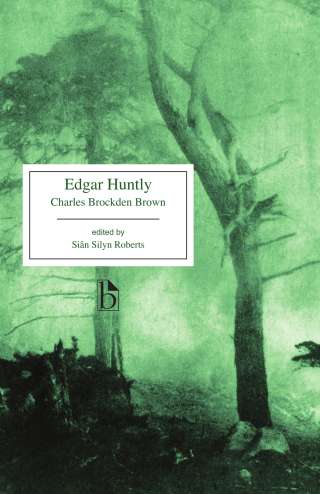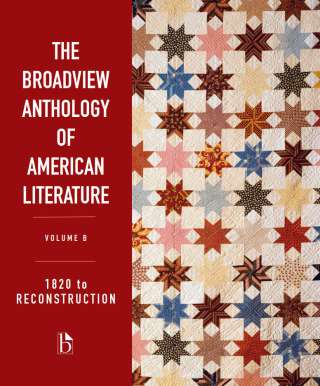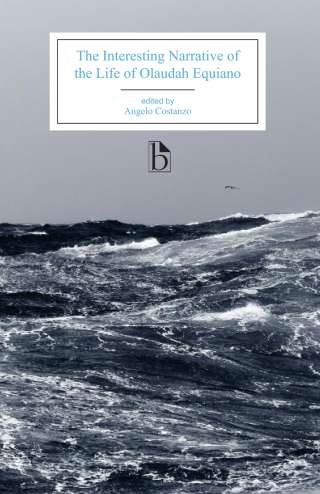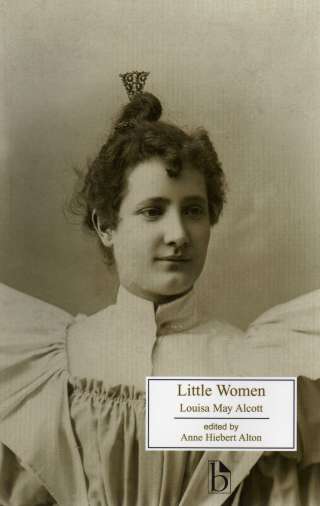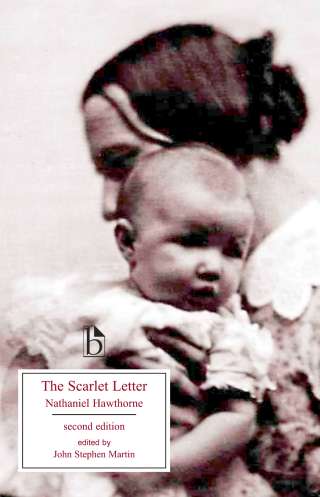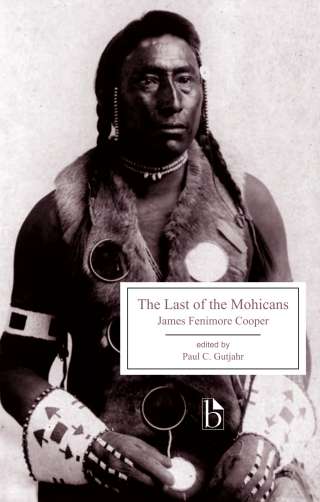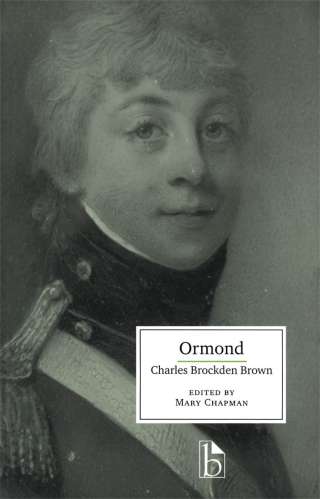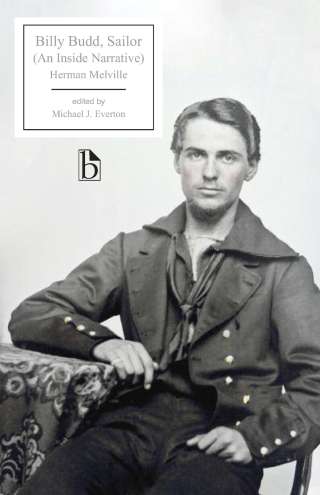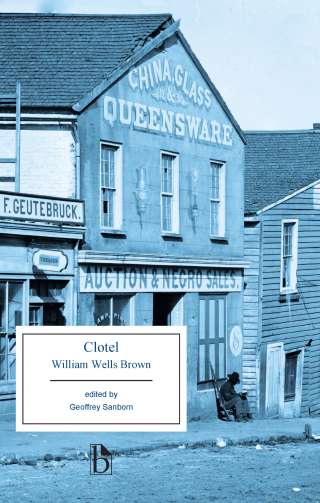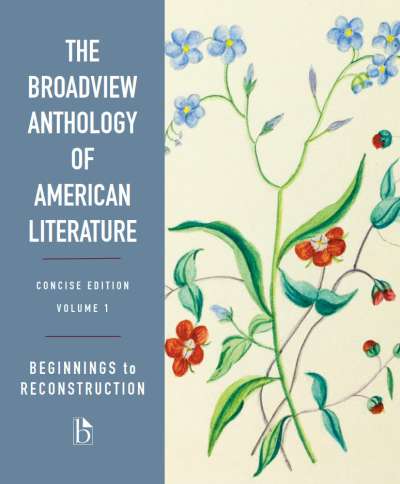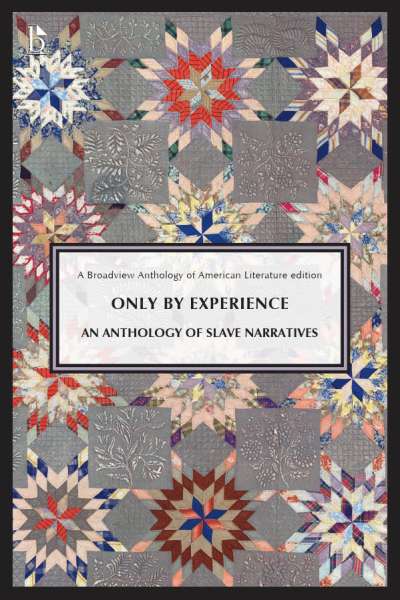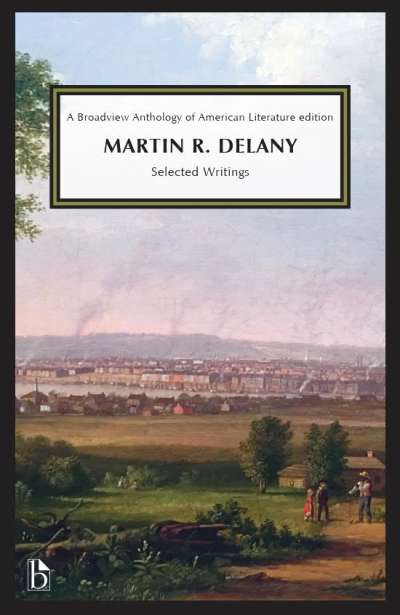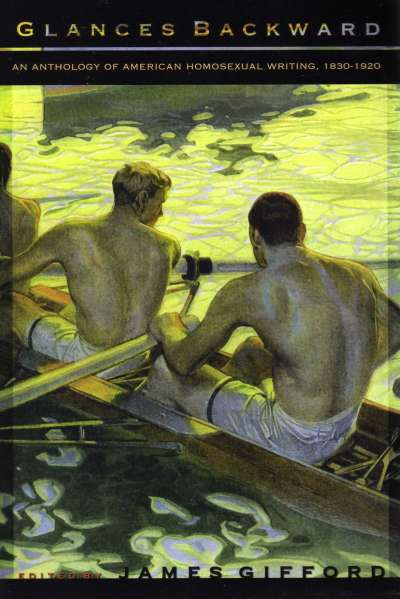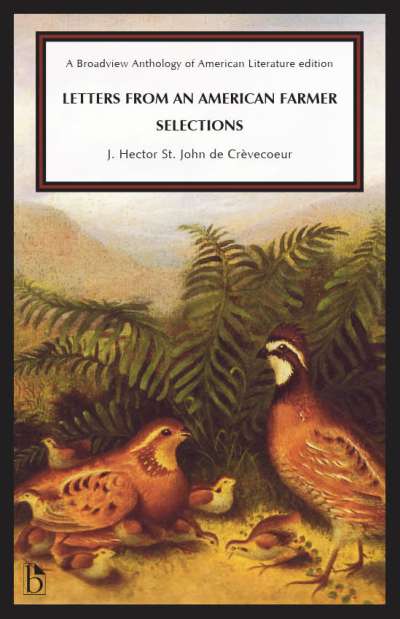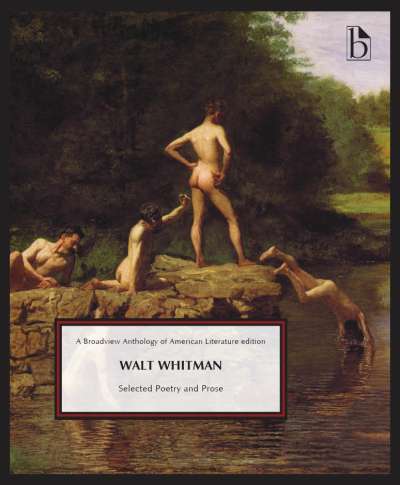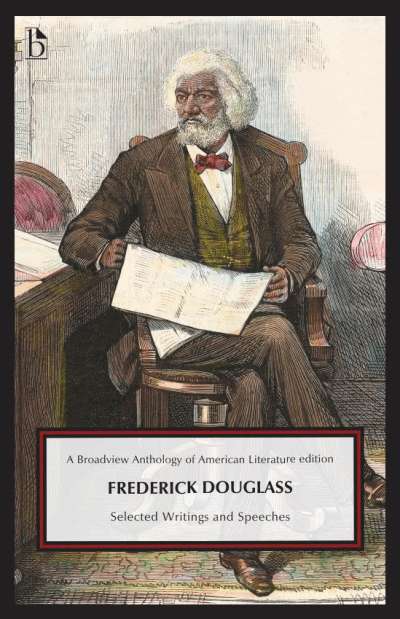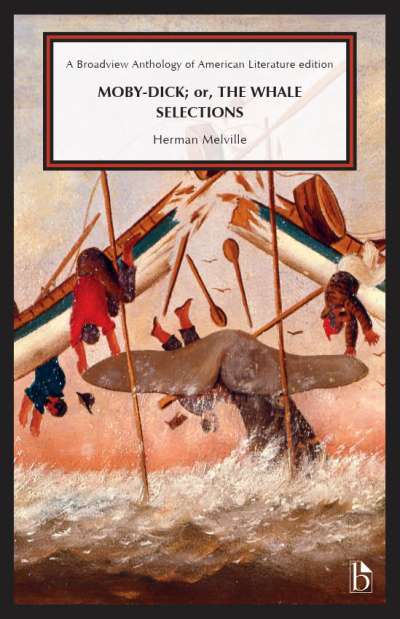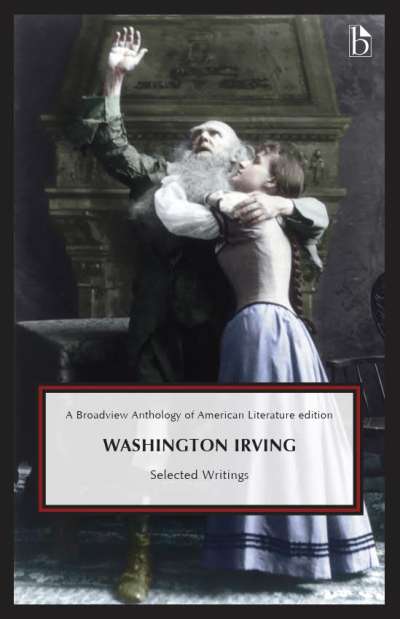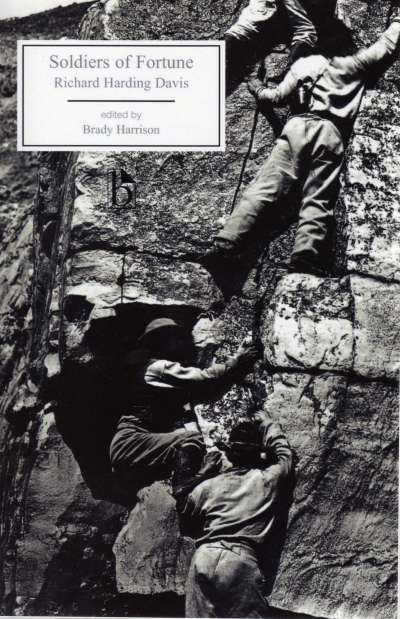About the Anthology
Covering American literature from its pre-contact Indigenous beginnings through the Reconstruction period, the first two volumes of The Broadview Anthology of American Literature represent a substantial reconceiving of the canon of early American literature. Guided by the latest scholarship in American literary studies, and deeply committed to inclusiveness, social responsibility, and rigorous contextualization, the anthology balances representation of widely agreed-upon major works with an emphasis on American literature’s diversity, variety, breadth, and connections with the rest of the Americas.
A shorter single volume covering the same period, The Broadview Anthology of American Literature, Concise Volume 1: Beginnings to Reconstruction, is also available.
Highlights of Volumes A & B: Beginnings to Reconstruction
- • Complete texts of Mary Rowlandson’s captivity narrative, The Coquette, Narrative of the Life of Frederick Douglass, An American Slave; and Benito Cereno
- • In-depth, Contexts sections on such topics as “Slavery and Resistance,” “Print Culture and Popular Literature,” “Expansion, Native American Expulsion, and Manifest Destiny,” and “Gender and Sexuality”
- • Broader and more extensive coverage of Indigenous oral and visual literature and African American oral literature than in competing anthologies
- • Full author sections in the anthology are devoted to authors such as Anne Hutchinson, Sor Juana Inés de la Cruz, Briton Hammon, Jane Johnston Schoolcraft, José Maria Heredia, Black Hawk, and many others
- • Extensive online component offers well over a thousand pages of additional readings and other resources
This two-volume package is available in both print (9781039301573) and digital (9781770488274) formats. If you are an instructor ordering this package for course use, please provide your bookstore with both ISBNs.
Volume A: Beginnings to 1820 and Volume B: 1820 to Reconstruction are also available separately.
Comments
“The Broadview Anthology is, quite simply, a breakthrough. From reproducing essential canonical texts to recovering unjustly forgotten ones, the editors offer a remarkably panoramic collection of American literature…. Meticulously researched and expertly assembled, the Broadview should be the new gold standard for scholars and teachers alike.”
— Michael D’Alessandro, Andrew W. Mellon Assistant Professor of English and Theater Studies, Duke University
“This is a literary anthology for a new generation, one that meets students where they live: both on the printed page and online. … I will be teaching with this anthology, and am confident that my classes will be greatly enriched by its capacious vision.”
— Hester Blum, Pennsylvania State University
“As Frederick Douglass’ experience teaches, an anthology, at its best, can be a point of entry into a world of literary expression, powerful and empowering. The Broadview Anthology of American Literature is exactly this. … What I like most about this anthology, though, is that it never forgets its most important audience: students. There is a wealth of material here that will help them imagine and reimagine what American literature could be.”
— Michael C. Cohen, UCLA
“The Broadview Anthology of American Literature sweeps impressively across vast early America…. The multiplicity of early American locations, languages, and genres is here on wondrous display.”
— Jordan Alexander Stein, Fordham University
“I am eager to teach with this anthology! It aligns with cutting-edge research through its selections, its introductions, and explanatory notes, and the texts are supplemented with primary documents that encourage teachers and students to think critically and dynamically.”
— Koritha Mitchell, The Ohio State University
“The Broadview Anthology of American Literature breathes new life into the early American literature survey. Its selections present early American literature in all its rich, weird, inviting abundance. … So much thought has been put into every aspect…, from the selection of texts to their organization to their presentation on the page; it will be a gift to classrooms for years to come.”
— Lara Langer Cohen, Swarthmore College
“… [M]y students LOVE The Broadview Anthology of American Literature. I am also so impressed with it—the emphasis on colonization/decolonization, the selections, the INTRODUCTIONS AND HEADNOTES!! It’s a superb anthology, and I'm looking forward to using it for many, many years. … The anthology is a triumph. It truly is.”
— Rebecca Bravard, Florida Southern College
“Big and bold … an important new option for teachers and students of American literature.”
— Maurice Lee, Boston University
“… Volumes A and B have wonderful choices, with the benefit of adding much more material through online links. The choices that the editors have made about popular culture and race are really welcome….”
— Shirley Samuels, Cornell University
“Hemispheric, multi-generic, [and] vibrantly illustrated, … this anthology is dynamic. Its capaciousness and ample resource materials make for a text that is always … meeting its readers in new ways.”
— Russ Castronovo, Tom Paine Professor of English and Dorothy Draheim Professor of American Studies, University of Wisconsin-Madison
“These two anthologies are by far the best of their kind I have seen. The range and diversity of authors, the rich historical contextualizations, the important and well-curated thematic ‘Contexts’ sections, and the careful and capacious scholarly insight that clearly animates the entire project make the volumes a superior choice for courses….”
— Mark Rifkin, University of North Carolina, Greensboro
“The Broadview Anthology of American Literature promises to be a dynamic addition to the genre—I’m very much looking forward to teaching from it.”
— Michael Borgstrom, San Diego State University
“I find myself taken aback by, and quite thrilled with, the way The Broadview Anthology of American Literature embodies the problematic possibilities of the canon.… Let us read and re-read [it] … for all the problems and possibilities it so brilliantly offers us.”
— David Kazanjian, Professor of English and Comparative Literature, University of Pennsylvania
“I’m very excited to teach from this new anthology!”
— Megan Walsh, St. Bonaventure University
“The Broadview Anthology of American Literature is an instructor’s dream for introducing students to the diversity and complexity of American literature. … This anthology is definitely a game changer in the study of American literature. I love it!”
— Venetria K. Patton, Dean, College of Liberal Arts & Sciences and Professor of English and African American Studies, University of Illinois at Urbana-Champaign
“[We have] stuck for years to the same basic format [for anthologies]: tiny print, crammed pages, and a weighty tome. The new Broadview, while still weighty, does not feel crammed. It uses double columns and wide pages to make the text seem almost inviting. I might pick this text over others on that basis alone, hoping it would lessen students’ dread when they start to read. But beyond a better feel, the double column [format] also enables comparisons of related texts and side-by-side translations… A change in format may seem small, but it makes a big difference.…
Several principles of selection [have been used]…: keeping the most-taught texts, adding space for once-popular authors…, and pushing forward some writers who [the editors] believe ‘deserve to be more widely taught’ or who ‘have been unjustly neglected.’ The end result is an extraordinary display of the well-known and the little-considered. To make space for so much material, the anthology includes a large website portion, edited like the physical text. Altogether, the anthology offers a remarkable collection with good online teaching aids, stunning visuals, and a powerful emphasis on the inclusion of voices from every part of America. …
[T]he history that comes to the fore in this anthology is the history most needed now….
… [I]f I teach from this anthology, as I think I will, I will be pulling a good deal from the online selections…. I will also want to use the online material about genre and form…. I will find myself with too much to teach and not enough time or space to do it. The new Broadview manages that difficulty by having a main emphasis to guide the printed selections, while making other points of focus available online.”
— Abram Van Engen, Early American Literature
“Guided by an out-standing team of General Editors, the Broadview Anthology is, one might argue, not merely another compilation of selections from American literature. Rather, it is an anthology (supplemented by online readings, audio selections, and an interactive timeline) that allows teachers to guide students into the various roles that works of literature and expressive culture have played in the process of American cultural history. Richly illustrated, with deep attention to such concerns as race, gender, class, and sexual orientation, and expertly edited and annotated, this anthology stands out above all others for its ability to make the case not only that surveys of American literature are still worth teaching but also that teaching these surveys remains essential, productive, and meaningful educational work.”
— John Earnest, University of Delaware, in American Periodicals

